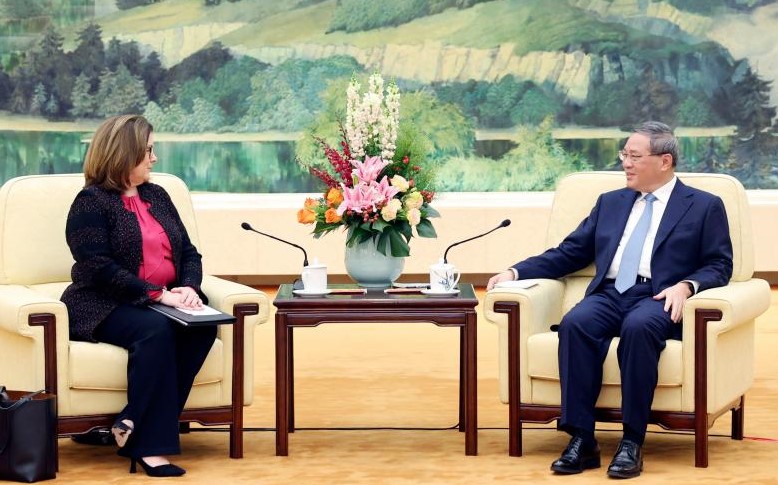BEIJING: Chinese Premier Li Qiang on Wednesday met with a U.S. Chamber of Commerce delegation led by the chamber’s President and CEO Suzanne Clark at the Great Hall of the People in Beijing.
Noting that this year marks the 45th anniversary of the establishment of diplomatic ties between China and the United States, Li said that the past 45 years have proved repeatedly that China and the United States benefit from cooperation and lose in confrontation. Cooperation is the only correct choice, he said.
Based on the principles of mutual respect, peaceful coexistence and win-win cooperation, China is ready to work with the United States to implement the important consensus reached by the two heads of state to promote the sound and steady development of bilateral relations, he said.
Li noted that the Chinese and U.S. economies are highly complementary, and their interests are deeply integrated. Both sides benefit from each other’s development, and strengthening economic and trade cooperation is beneficial to both countries.
The two sides should be partners rather than rivals, he said, noting that engaging in “decoupling” or “small yard, high fence” strategies is not in the fundamental interests of either side and will only bring huge losses to enterprises in the two countries, to the economy, and even to global development.
Li said that China is pursuing Chinese modernization through high-quality development and will continue to unleash huge demand in advanced manufacturing, new-type urbanization, the upgrading of the consumption structure, and green and low-carbon transformations. He noted that U.S. companies are welcome to continue investing in China and deepening their presence in the Chinese market to share the development opportunities.
He said that China will open its door even wider to the outside world, continue to foster a market-oriented, law-based and internationalized business environment, and provide more support and convenience for U.S. companies and foreign firms from other countries to invest and do business in China.
It is hoped that the U.S. Chamber of Commerce and its entrepreneurs will continue to serve as a bridge in promoting increased communication and mutual understanding between the two countries, Li said.
For her part, Clark said the U.S.-China relationship is extremely important. A decoupling between the United States and China is not a viable option, and China’s further opening-up is welcome, she said.
The U.S. Chamber of Commerce is willing to act as a bridge, conduct candid and constructive communication and exchanges with the Chinese side, make efforts to deepen U.S.-China economic and trade relations and mutually beneficial cooperation, and promote the steady development of U.S.-China relations, she said.


